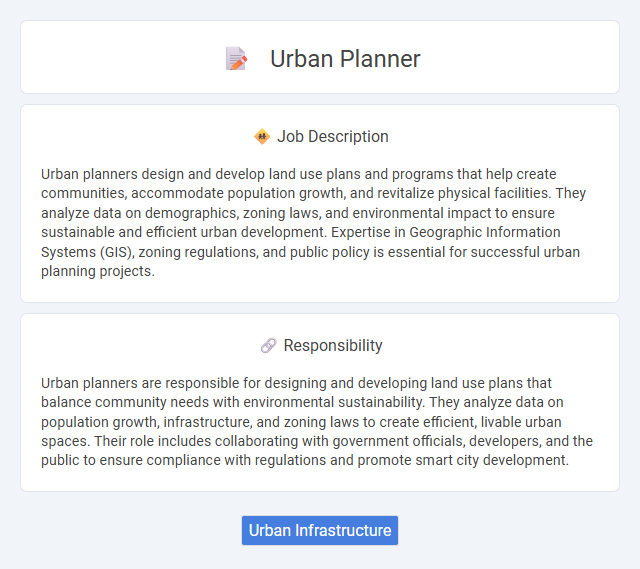
Urban planners design and develop land use plans and programs that help create communities, accommodate population growth, and revitalize physical facilities. They analyze data on demographics, zoning laws, and environmental impact to ensure sustainable and efficient urban development. Expertise in Geographic Information Systems (GIS), zoning regulations, and public policy is essential for successful urban planning projects.
People with strong analytical skills and a passion for improving community living conditions are likely to find urban planning a suitable career. Those who enjoy problem-solving, working with diverse stakeholders, and envisioning sustainable city developments may adapt well to the demands of this job. Individuals who prefer routine tasks or isolated work might find urban planning less compatible with their preferences.
Qualification
Urban planners typically require a bachelor's degree in urban planning, geography, or a related field, with many positions favoring a master's degree in urban or regional planning. Professional certification such as the American Institute of Certified Planners (AICP) credential enhances job prospects and demonstrates expertise. Strong skills in GIS mapping, data analysis, zoning laws, and sustainable development principles are essential for effective urban planning.
Responsibility
Urban planners are responsible for designing and developing land use plans that balance community needs with environmental sustainability. They analyze data on population growth, infrastructure, and zoning laws to create efficient, livable urban spaces. Their role includes collaborating with government officials, developers, and the public to ensure compliance with regulations and promote smart city development.
Benefit
Urban planner jobs likely offer significant benefits such as contributing to sustainable community development and improving quality of life for residents. There is a strong probability of gaining experience in diverse areas like environmental design, zoning laws, and public policy. Employees in this field may also benefit from job stability and opportunities for career advancement in both public and private sectors.
Challenge
Urban planners face the challenge of balancing development with sustainable growth, as they must consider environmental impact, community needs, and infrastructure limitations. The complexity increases with evolving regulations and population dynamics, requiring adaptability and innovative problem-solving skills. Probability suggests that successful planners will need to integrate advanced data analytics to anticipate future urban trends and mitigate potential issues.
Career Advancement
Urban planners often advance their careers by gaining specialized knowledge in sustainable development and smart city technologies, which are increasingly in demand. Pursuing advanced degrees such as a Master's in Urban Planning or certifications like LEED can enhance qualifications and open opportunities for leadership roles. Experienced urban planners may transition into senior positions such as planning directors, project managers, or consultants in government agencies, private firms, and non-profit organizations.
Key Terms
Urban Infrastructure
Urban planners specializing in urban infrastructure design comprehensive systems incorporating transportation networks, utilities, and public spaces to enhance city functionality and sustainability. They analyze demographic data, land use patterns, and environmental impact to develop efficient infrastructure projects that support economic growth and improve quality of life. Expertise in zoning regulations, civil engineering principles, and smart city technologies enables urban planners to create resilient and adaptable urban environments.
 kuljobs.com
kuljobs.com